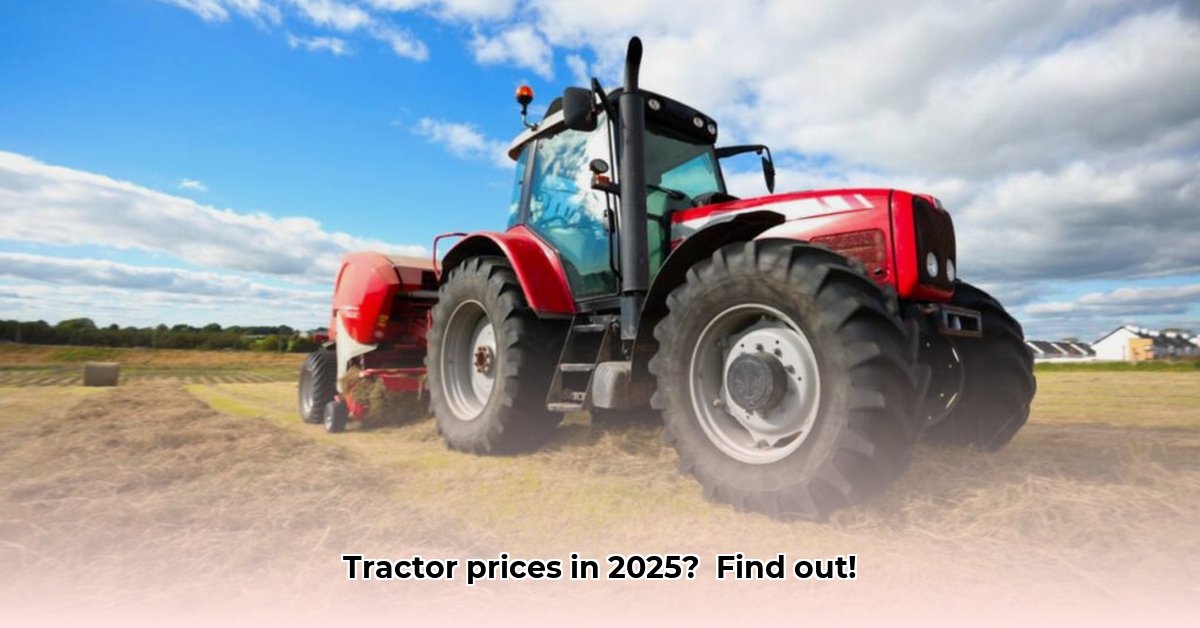
Buying a large tractor is a substantial investment for any farmer, especially those prioritizing sustainable agricultural practices. This isn't solely about the initial purchase price; it encompasses a comprehensive assessment of all associated costs, from fuel consumption and maintenance to potential repairs and insurance. For more detailed information on tractor selection, see our comprehensive guide: Tractor Buying Guide. This guide provides a structured approach to evaluating tractor costs, enabling informed decision-making for a financially sound and environmentally responsible farming operation.
Factors Affecting Tractor Cost: Decoding the Price Tag
The price of a large tractor exhibits considerable variability, ranging from several thousand dollars to well over six figures. Several key factors influence this price range. Understanding these is critical to making a cost-effective purchase.
Horsepower (HP): Higher horsepower signifies greater power and capacity, directly impacting the purchase price. A 100 HP tractor will cost significantly less than a 300 HP model designed for large-scale farming. This isn't a linear relationship; price increases accelerate with increasing horsepower.
Brand and Model: Reputable brands often command premium prices due to their established reputation for quality and performance. Comparing models from various manufacturers is essential for finding value.
Age: Purchasing a used tractor substantially reduces the initial investment. However, this also increases the risk of higher maintenance and repair costs. New tractors, while more expensive upfront, usually offer extended warranties and lower short-term maintenance costs.
Features and Technology: Modern tractors often boast advanced technology like GPS guidance, automatic steering, and precision farming tools. These features increase the purchase price, but may significantly enhance efficiency and yield.
Attachments and Implements: Additional tools like plows, planters, and loaders significantly increase the overall cost. Carefully assess which attachments are genuinely necessary for your specific farming operations.
New vs. Used Tractors: A Comparative Analysis
The choice between a new or used tractor presents a crucial trade-off between initial cost and long-term expense.
| Feature | New Tractor | Used Tractor |
|---|---|---|
| Purchase Price | High | Low |
| Warranty | Typically comprehensive | Often limited or nonexistent |
| Maintenance | Generally lower initially | Potentially higher |
| Fuel Efficiency | Usually better due to newer engine technology | Can vary greatly depending on age and condition |
| Technology | Latest features | Older technology |
| Resale Value | Generally retains value better | Depreciates more quickly |
Calculating Total Cost of Ownership (TCO): The Complete Picture
The sticker price only represents a fraction of the total cost. Accurately estimating the Total Cost of Ownership (TCO) is critical. This involves:
Purchase Price: The initial cost, including taxes and delivery fees.
Financing Costs: Interest payments if financing the purchase. Secure the most favorable loan terms to minimize these costs.
Annual Maintenance: Regular servicing (oil changes, filter replacements) is crucial for optimal performance and longevity.
Repair Costs: Allocate funds for unexpected repairs and part replacements. This is particularly pertinent for used tractors.
Fuel Costs: Diesel fuel constitutes a substantial operational expense. Accurately estimate annual fuel consumption based on your farming operations.
Insurance: Protect your investment with suitable insurance coverage.
Depreciation: Tractors depreciate over time; factor this into your cost calculations.
Rhetorical Question: Isn't a thorough TCO calculation essential for ensuring the long-term financial viability of your farm?
Sustainable Considerations: Environmental Impact and Long-Term Costs
Sustainable agriculture demands responsible resource management. When selecting a tractor, consider the following:
Fuel Efficiency: Prioritize tractors with fuel-efficient engines to minimize fuel consumption and operating costs, while also reducing your farm's carbon footprint.
Emissions: Modern tractors incorporate reduced emissions technologies; choosing a newer model contributes to environmental sustainability.
Lifecycle Considerations: Assess the tractor's entire lifecycle, including its manufacturing, operation, and eventual disposal or recycling, to minimize its environmental impact.
Quantifiable Fact: Fuel-efficient tractors can reduce fuel costs by up to 20%, leading to significant savings over the tractor's lifespan.
Choosing the Right Tractor: A Step-by-Step Guide
Selecting the appropriate tractor involves a methodical process:
Assess Your Needs: Define the tractor's intended use (planting, harvesting, etc.), and the size of the fields it will operate on. This determines the required horsepower and essential features.
Set a Budget: Establish a realistic budget based on your TCO calculations.
Thorough Research: Compare different models and brands, considering features, reliability, and price. Seek recommendations from other farmers.
Explore Financing: Evaluate loan options and lease agreements to identify the best financing solution.
Test Drive (if possible): If buying new, test drive different models to determine the best fit for your needs and preferences. If buying used, obtain a thorough pre-purchase inspection.
Finalize the Purchase: After careful consideration, finalize the tractor purchase and integrate it into your existing farm operations.
Conclusion: Investing in Your Farm's Future
The optimal tractor is not necessarily the most expensive; it's the one that best aligns with your needs, budget, and commitment to sustainable agriculture. Remember, this is a significant investment in your farm's future, so make a well-informed decision to ensure long-term success and profitability. By following the steps outlined in this guide, you can confidently select a tractor that's both cost-effective and environmentally responsible.
Expert Quote: "Sustainable farming practices are not only good for the environment, but they also contribute to better long-term economic stability for farmers," says Dr. Emily Carter, Professor of Agricultural Economics at State University.